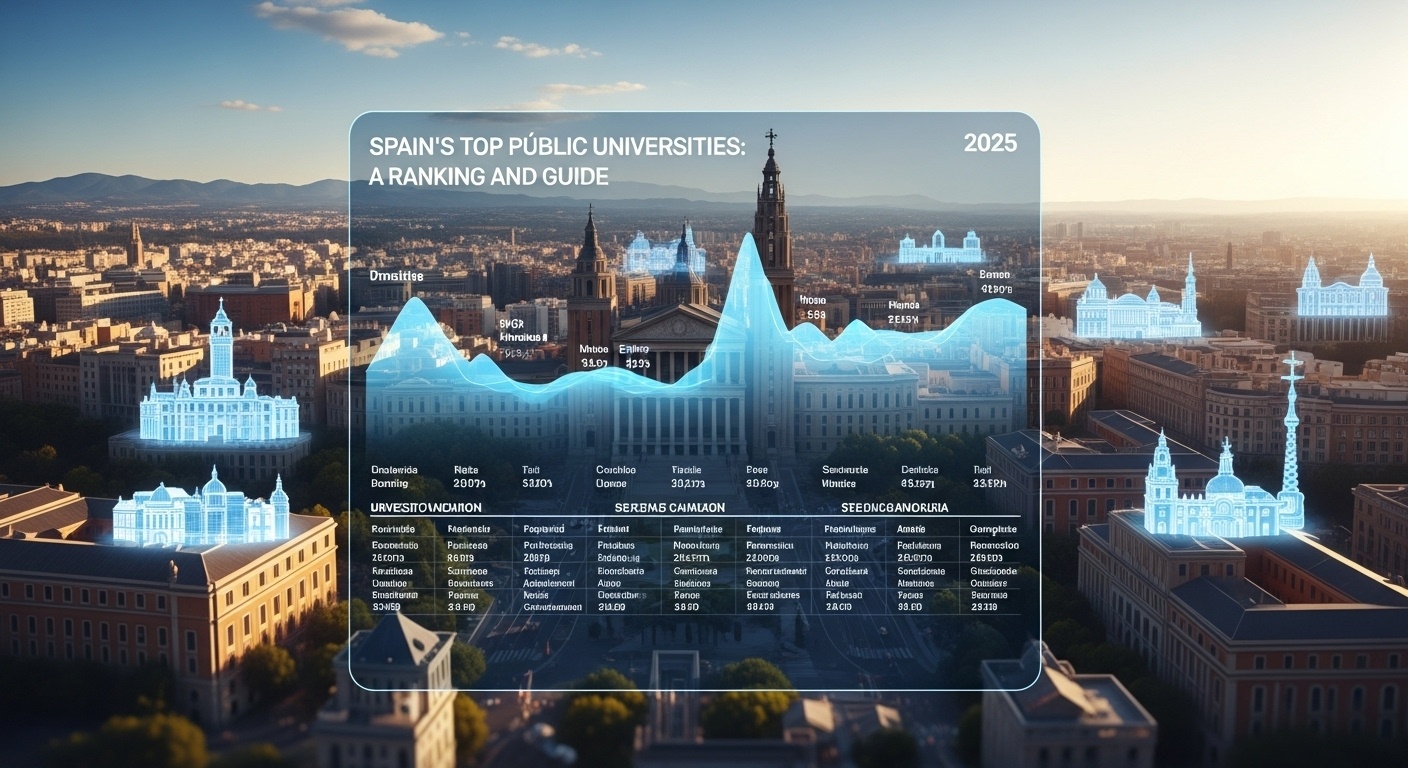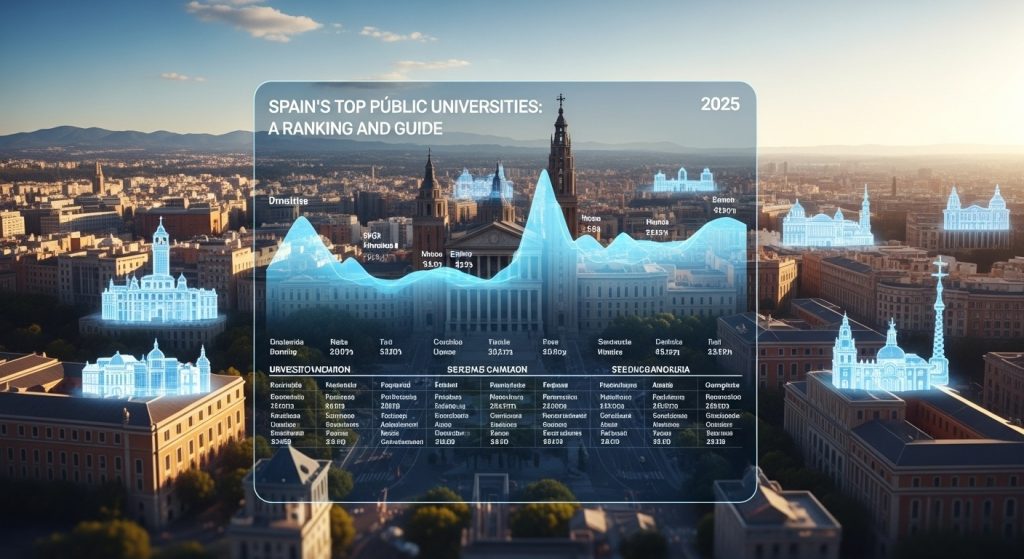Spain’s higher education landscape is evolving rapidly, demanding a fresh perspective on its leading institutions. Forget outdated reputations; in 2025, factors like research output in burgeoning fields like AI and sustainable energy, alongside successful industry partnerships, are reshaping the university hierarchy. The University of Barcelona, for instance, is aggressively investing in quantum computing research, while the Polytechnic University of Valencia champions cutting-edge agricultural technology. This analysis dives deep into these dynamic shifts, presenting a data-driven ranking of Spain’s top public universities. It’s not just about prestige; it’s about identifying institutions best positioned to equip students for the challenges and opportunities of tomorrow.

Understanding Spain’s Higher Education Landscape
Spain boasts a rich academic tradition and a growing reputation for offering high-quality, affordable education, particularly within its public university system. Understanding the nuances of this system is crucial for prospective students, both domestic and international. Unlike some countries where private institutions dominate rankings, Spain’s public universities often lead the pack, reflecting significant government investment and a commitment to accessible education.
The Spanish university system adheres to the European Higher Education Area (EHEA), meaning degrees are structured according to the Bologna Process. This standardization facilitates international recognition and student mobility. Expect to see degree programs structured as follows:
- Grado (Bachelor’s Degree): Typically 4 years in duration.
- Máster (Master’s Degree): Usually 1-2 years following a Grado.
- Doctorado (Doctorate): The highest academic degree, requiring several years of research after a Máster.
Access to public universities in Spain is primarily determined by your Bachillerato (Spanish secondary education diploma) grade and the results of the Selectividad (university entrance exam), now officially called Evaluación del Bachillerato para el Acceso a la Universidad (EBAU) in most regions. International students often have to go through a homologation process to validate their secondary education qualifications. Each university also has its own specific admission requirements and may conduct additional entrance exams or interviews, especially for competitive programs like medicine.
Key Factors Influencing University Rankings
University rankings are a multifaceted evaluation. Different ranking systems prioritize different factors. Understanding these factors is essential for interpreting rankings and choosing the university that best fits your individual needs and aspirations. Common ranking factors include:
- Research Output and Impact: This encompasses the volume of published research, citations received. The impact factor of journals where research is published. Universities with a strong research focus often excel in these metrics.
- Teaching Quality: Assessing teaching quality is complex. It often involves student-to-faculty ratios, student satisfaction surveys. The availability of resources and support for students.
- Internationalization: This measures the university’s global outlook, including the percentage of international students and faculty, participation in international research collaborations. The availability of courses taught in English.
- Employability: This factor considers the university’s reputation among employers, the career services offered to students. The employment rates of graduates.
- Citations: How often a university’s published works are referenced in other research.
- Academic Reputation: A survey-based measure of how academics around the world view the quality of the university.
- Industry Income: Research income from industry; a measure of research relevance.
It’s crucial to consider the methodology of each ranking system and how the weighting of these factors might influence the results. For example, a university with a strong focus on research might rank highly in systems that prioritize research output, while a university with a strong emphasis on teaching and student satisfaction might rank higher in systems that place more weight on these aspects.
Top Public Universities: A Potential 2025 Lineup
Predicting the exact rankings for 2025 is impossible, as rankings fluctuate annually. But, based on current trends and historical performance, here’s a look at some of Spain’s consistently top-performing public universities, which are likely to remain strong contenders:
- Universitat de Barcelona (UB): Consistently ranked among the top universities in Spain and globally. Known for its strong research output across various disciplines, particularly in medicine, humanities. Social sciences.
- Universidad Autónoma de Madrid (UAM): Another leading university with a strong research profile, especially in areas like physics, mathematics. Law. Its campus offers a vibrant student life.
- Universidad Complutense de Madrid (UCM): One of the oldest and largest universities in Spain, offering a comprehensive range of programs across all disciplines. UCM has a long-standing tradition of academic excellence and boasts a significant alumni network.
- Universitat Autònoma de Barcelona (UAB): Located near Barcelona, UAB is known for its innovative teaching methods and strong focus on internationalization. It excels in areas like economics, political science. Environmental sciences.
- Universitat Politècnica de València (UPV): A leading technological university, UPV excels in engineering, architecture. Related fields. It has strong links with industry and offers excellent opportunities for internships and practical experience.
- Universitat Pompeu Fabra (UPF): While relatively young compared to other Spanish universities, UPF has quickly established a reputation for excellence in economics, law. Communication. It has a strong international orientation and a focus on research.
- Universidad Carlos III de Madrid (UC3M): Known for its strong programs in economics, business. Law, UC3M has a modern and international outlook. It also has a well-regarded engineering school.
- Universidad de Valencia (UV): A comprehensive university offering a wide range of programs, particularly strong in sciences, humanities and medicine.
It’s essential to note that these universities are all excellent options. The “best” university for you will depend on your specific academic interests, career goals. Personal preferences.
Spotlight on Specific Programs and Departments
While overall university rankings provide a general overview, it’s often more helpful to research the specific programs and departments that interest you. Some universities may be particularly strong in certain fields, even if their overall ranking is slightly lower.
For example:
- Medicine: UB, UAM, UCM. UV are consistently strong in medical education and research.
- Engineering: UPV, Universitat Politècnica de Catalunya (UPC) which is also very strong. UC3M are well-regarded for their engineering programs.
- Business and Economics: UC3M, UPF. UAB often rank highly for their business and economics programs.
- Law: UAM, UCM. UPF are known for their prestigious law schools.
- Humanities: UB, UCM. UAB offer a wide range of excellent humanities programs.
Consider checking departmental rankings and researching the faculty members in your field of interest. Look for professors who are actively involved in research and have a strong publication record. Also, consider the curriculum offered by each program and whether it aligns with your academic and career goals.
Tuition Fees and Funding Opportunities
One of the major advantages of studying at a public university in Spain is the relatively low tuition fees, especially compared to other European countries or the United States. Tuition fees are set by the regional governments and vary depending on the degree program and the student’s nationality. EU citizens typically pay lower tuition fees than non-EU citizens.
As a general guideline, expect to pay:
- Bachelor’s Degrees: €700 – €2,500 per year for EU citizens; €2,000 – €5,000+ per year for non-EU citizens.
- Master’s Degrees: €1,000 – €3,500 per year for EU citizens; €2,500 – €7,000+ per year for non-EU citizens.
These are just estimates. It’s essential to check the specific tuition fees for your chosen program at the university’s website. In addition to tuition fees, you’ll also need to budget for living expenses, including accommodation, food, transportation. Other personal costs. Living costs vary depending on the city, with Madrid and Barcelona being the most expensive.
Fortunately, there are various funding opportunities available to students, including:
- Government Scholarships: The Spanish government offers scholarships to both domestic and international students.
- University Scholarships: Many universities offer their own scholarships and grants based on academic merit or financial need.
- External Scholarships: Numerous private organizations and foundations offer scholarships to students studying in Spain.
- Erasmus+ Program: The Erasmus+ program provides funding for students from participating countries to study or work abroad in Spain.
Researching and applying for scholarships can significantly reduce the financial burden of studying in Spain. Be sure to check the eligibility criteria and application deadlines for each scholarship.
Navigating the Application Process
The application process for public universities in Spain can be complex, especially for international students. It typically involves the following steps:
- Researching Programs and Universities: Identify the programs and universities that align with your academic interests and career goals. Check the admission requirements and application deadlines for each program.
- Homologation of Foreign Qualifications: If you have completed your secondary education outside of Spain, you’ll likely need to have your qualifications homologated (officially recognized) by the Spanish Ministry of Education. This process can take several months, so it’s essential to start early.
- Taking the Selectividad/EBAU (if required): Some universities may require international students to take the Selectividad (university entrance exam), also known as EBAU. Check with the university to determine if this is necessary.
- Submitting Your Application: Most universities have an online application portal where you can submit your application documents, including your academic transcripts, passport. Other required materials.
- Waiting for Admission Decision: The admission decision process can take several weeks or months. You’ll typically receive an email or letter informing you of the outcome of your application.
- Accepting Your Offer and Enrolling: If you receive an offer of admission, you’ll need to accept it and pay the enrollment fees to secure your place at the university.
- Applying for a Student Visa (if required): If you’re a non-EU citizen, you’ll need to apply for a student visa to study in Spain. This process can take several weeks or months, so it’s vital to start early.
It’s crucial to carefully follow the instructions provided by each university and to submit all required documents by the deadlines. Don’t hesitate to contact the university’s international student office if you have any questions or need assistance.
Life as a Student in Spain
Studying in Spain offers a unique and enriching experience that extends far beyond the classroom. Spain is a vibrant country with a rich culture, delicious cuisine. Stunning landscapes. As a student in Spain, you’ll have the opportunity to:
- Learn Spanish: Immersing yourself in the Spanish language and culture is one of the most rewarding aspects of studying in Spain.
- Travel and Explore: Spain offers a diverse range of attractions, from historic cities to beautiful beaches to majestic mountains. Take advantage of your time in Spain to travel and explore the country.
- Experience Spanish Culture: Spain has a rich cultural heritage, with influences from Roman, Moorish. Christian traditions. Attend festivals, visit museums. Try traditional Spanish cuisine to immerse yourself in the culture.
- Meet People from Around the World: Spanish universities attract students from all over the world, providing you with the opportunity to meet people from diverse backgrounds and make lifelong friends.
- Enjoy the Spanish Lifestyle: Spain is known for its relaxed and sociable lifestyle. Enjoy the sunshine, the tapas. The vibrant nightlife.
Adapting to a new culture can be challenging. It’s also an opportunity for personal growth and development. Be open to new experiences, embrace the Spanish culture. Make the most of your time as a student in Spain. Studying at a university in Spain offers an unparalleled opportunity for academic growth, cultural immersion. Personal development. The top public universities provide a high-quality education at an affordable price, making Spain an attractive destination for students from around the world.
Conclusion
Choosing a Spanish public university is an investment in your future. Hopefully, this guide has illuminated the path towards your 2025 academic goals. Remember, rankings are just one piece of the puzzle. While institutions like the Universitat de Barcelona and Universidad Complutense de Madrid consistently shine, consider your individual needs and program specifics. For instance, if marine biology is your passion, the University of Cádiz, with its proximity to the coast, might be a better fit, despite a slightly lower overall ranking. My personal tip? Reach out to current students in your desired program. Their firsthand experiences are invaluable. Moreover, with the rise of online learning, check if your target university offers blended programs, allowing for greater flexibility. Don’t just dream of Spain; actively plan your journey. Research visa requirements early, explore scholarship opportunities. Begin learning Spanish – even basic phrases will significantly enhance your experience. Embrace the challenge. vamos, make your Spanish university dream a reality!
More Articles
Crafting Compelling Statements: How to Make Your Application Truly Stand Out
Decoding University Admissions: Understanding Key Criteria for a Successful Application
Maximize Your Score: Effective Test-Taking Strategies for Entrance Exams
Conquer Exam Stress: Practical Techniques for Staying Calm and Focused
FAQs
Okay, so what exactly does this ‘2025 Ranking’ thing mean? Is it like, set in stone?
Good question! Think of it as a snapshot in time. These rankings usually consider factors like research output, teaching quality, international outlook. Reputation. While they give you a good idea of which universities are performing well, things can change year to year! So, it’s a guide, not gospel.
What makes a university ‘public’ in Spain? Is it free?
Public universities in Spain are primarily funded by the government, making them much more affordable than private institutions. And no, tuition isn’t free free. It’s significantly lower than in many other European countries or the US. You’ll still pay something. It’s a steal comparatively!
I hear a lot about specific rankings. Which ranking systems are generally considered the most reputable when looking at Spanish universities?
You’ve got the big international players like QS World University Rankings, Times Higher Education (THE). The Shanghai Ranking (ARWU). Domestically, you might see rankings from Spanish newspapers or organizations. The international ones are generally more widely recognized and provide a broader perspective.
What kind of things should I be looking for in a ranking beyond just the overall number? Like, what if I’m interested in a specific subject?
Excellent point! Don’t just blindly follow the overall score. Most rankings break down performance by subject area. So, if you’re dead-set on studying, say, engineering, look at how each university performs specifically in engineering. Some universities are powerhouses in certain fields but weaker in others.
Let’s say I’m applying from outside Spain. Is getting into a top public university realistic, or super competitive?
It’s definitely competitive. Absolutely achievable! You’ll need to make sure your qualifications are recognized (usually through a process called homologation). You’ll likely need to take an entrance exam called the Selectividad (or its equivalent for international students). Start your research early and be prepared for some paperwork!
Besides rankings, what else should I consider when choosing a university? I’m kind of overwhelmed!
Totally understandable! Think about location – do you prefer a bustling city or a quieter campus town? Consider the specific programs offered – does the university have a strong department in your area of interest? And don’t forget about student life – what kind of clubs and activities are available? Visit if you can, or at least do a virtual tour. It’s about finding the right fit for you.
What’s the deal with language requirements? Do I need to be fluent in Spanish to study at a public university?
For most degrees, yes, you’ll need a good command of Spanish. Many universities offer language courses for international students. You’ll generally need to demonstrate proficiency (usually through a DELE exam) to enroll in regular degree programs. Some universities offer programs taught in English. They’re less common, especially at the undergraduate level. Double-check the specific requirements for your chosen program!



